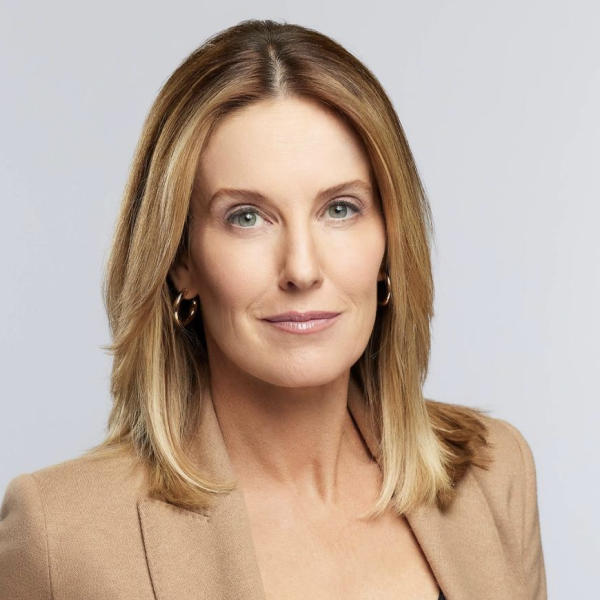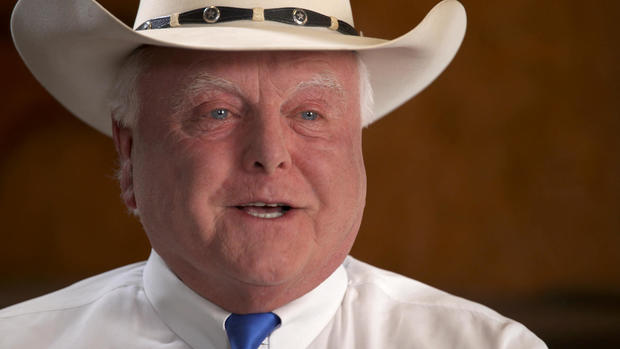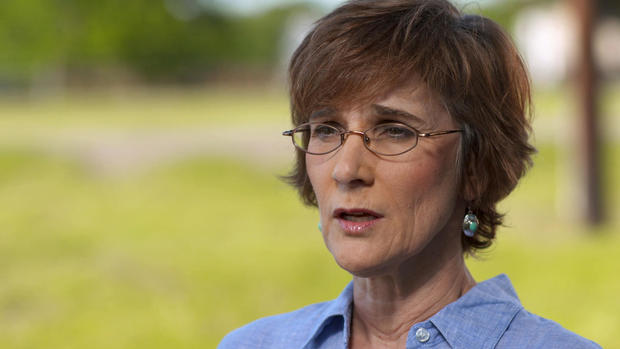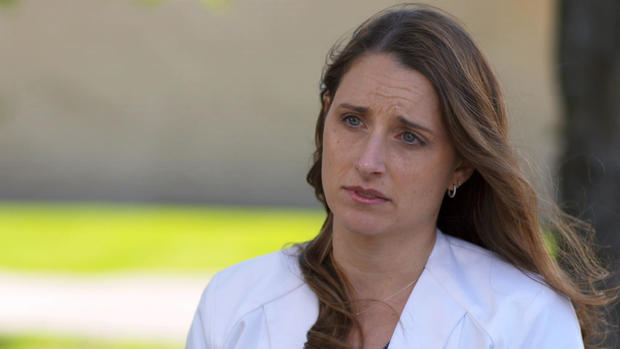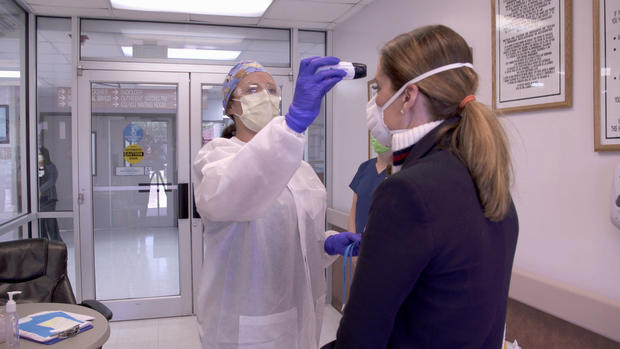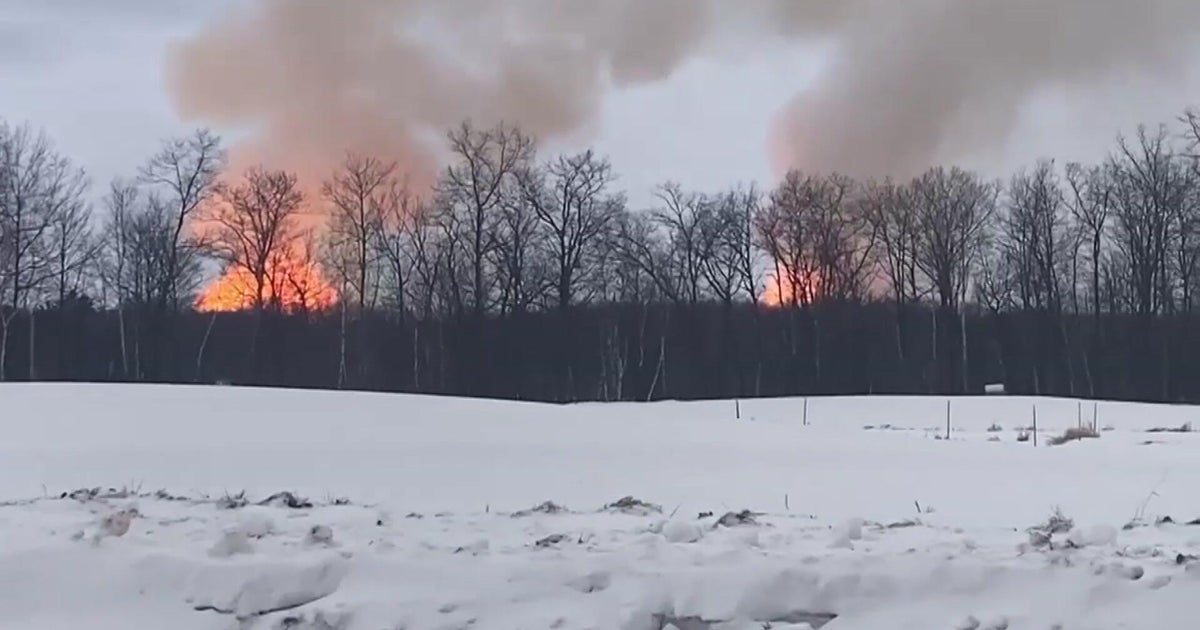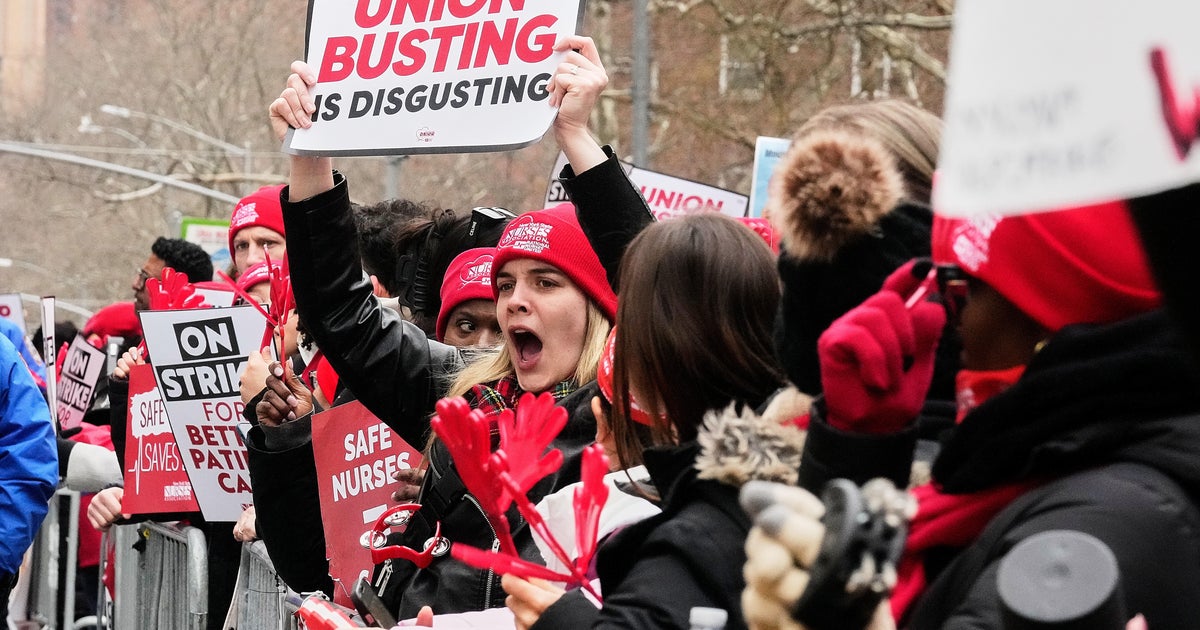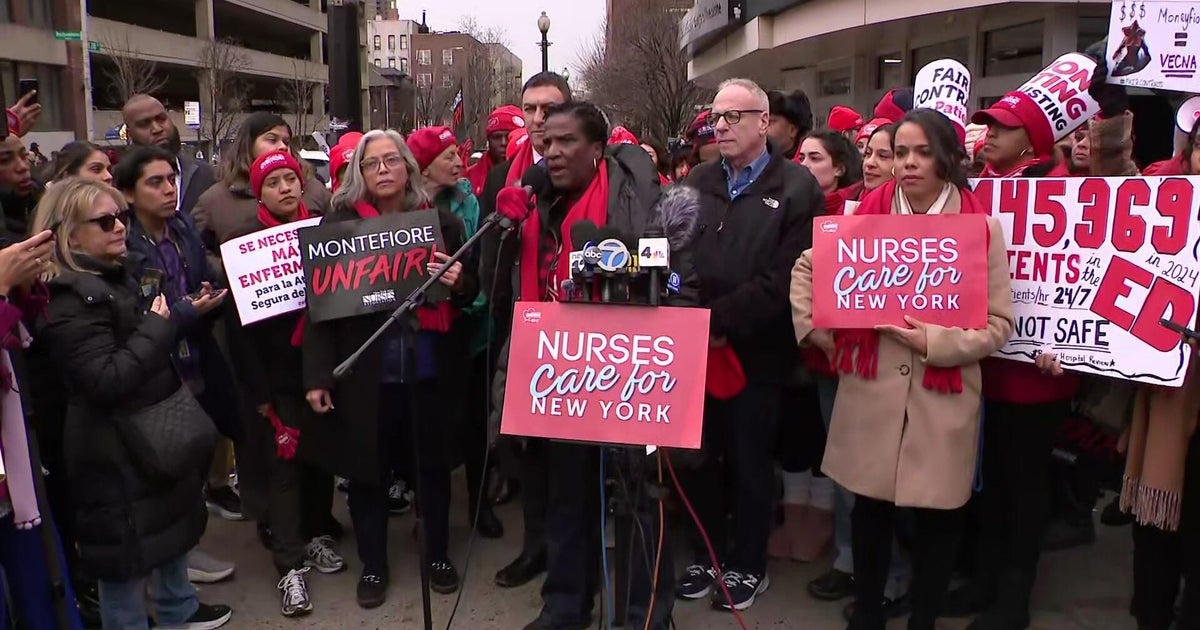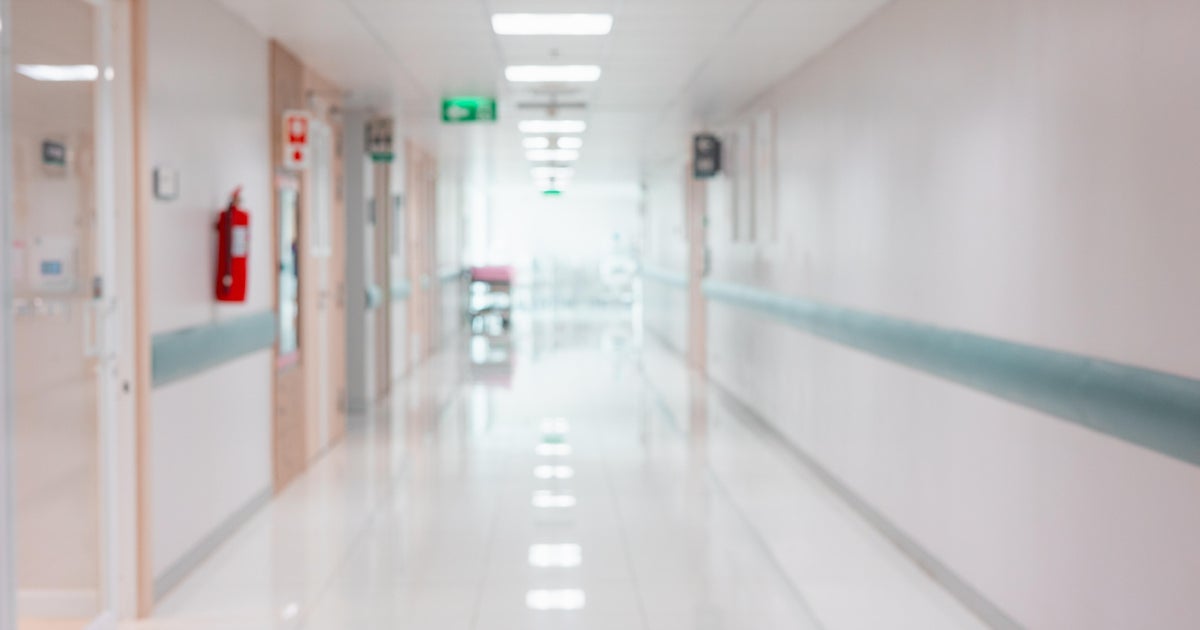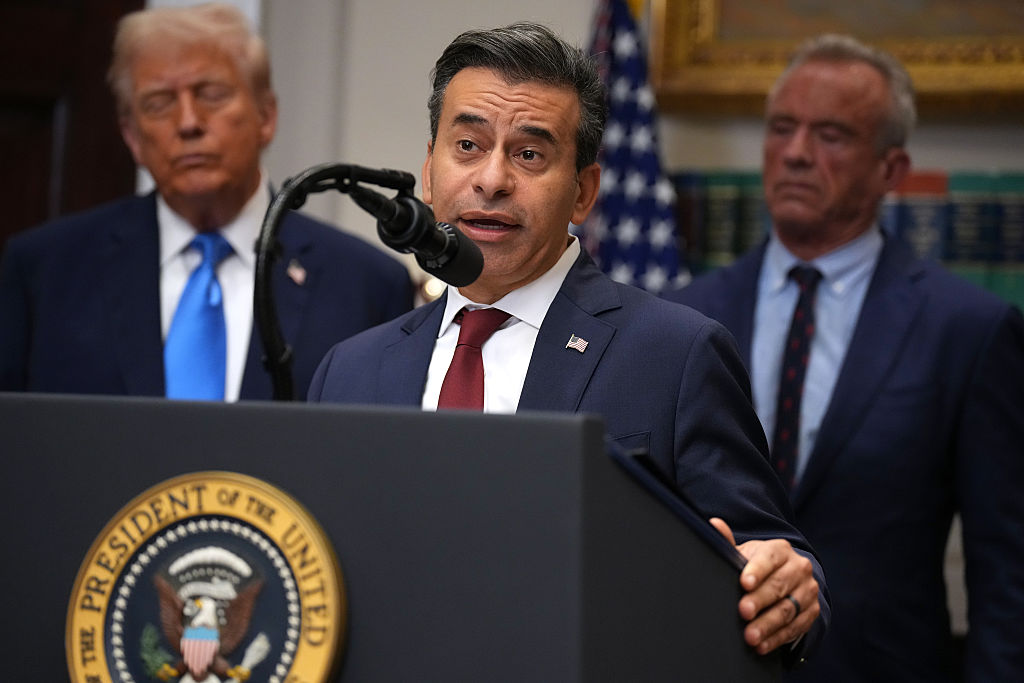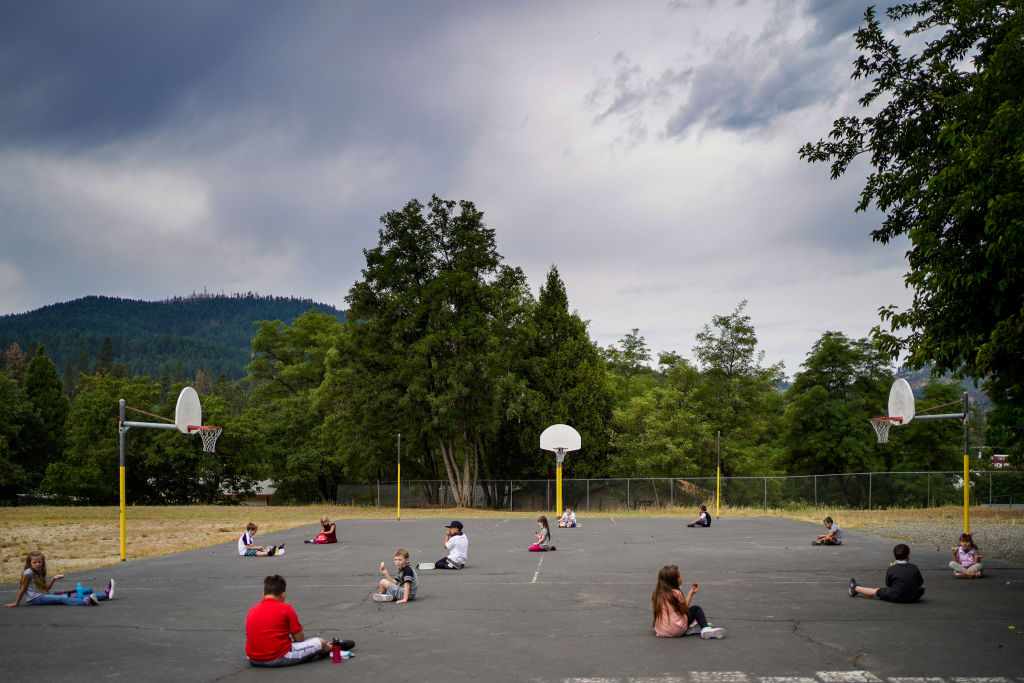Doctor, nurse practitioner dipping into own pockets to provide rural health care in Texas
The state of Texas has three of the biggest cities in America, but it has not suffered the same number of COVID-19 infections as other large states. As of Friday, Texas was ranked 9th. But Texas also ranks near the bottom when it comes to the percentage of residents it's tested -- and that worries some doctors and nurses, especially those in rural areas of the state.
- Coronavirus: How Texas' digital divide hampers healthcare
- Lesley Stahl shares her personal battle with coronavirus
Many small hospitals and clinics around the country are fearful they don't have the staff and budget to survive the pandemic.
Among those trying to prop up the system in Texas is Sid Miller, the commissioner of agriculture, who wears many hats. He came to our interview wearing a custom made white one.
Sid Miller: Well, I'm the commissioner of agriculture. Course we oversee, you know, cows, plows, and sows, but that's-- I'm also the Commissioner of the State Office of Rural Health. So we-- we're-- we're trying to keep 163 rural hospitals open and from, you know, going out of business.
Sharyn Alfonsi: Any sense of how many hospitals-- rural hospitals are at risk right now in Texas?
Sid Miller: Well, of the 163 we have, 60 of 'em have less than 30 days' cash on hand.
Sharyn Alfonsi: Whoa.
Sid Miller: Yeah, some of them-- actually, we had one filing for bankruptcy this week.
Sharyn Alfonsi: A hospital?
Sid Miller: In Alpine, Texas, and the parent company are filing for bankruptcy. So we've already--
Sharyn Alfonsi: Did this push them over the edge, the COVID?
Sid Miller: Yes, it-- it pushed them over the edge. And I'm-- I'm afraid this pandemic-- we're gonna-- we're gonna continue to lose health care providers in rural Texas and across the nation.
Low reimbursement rates and high numbers of uninsured patients have forced 128 hospitals that served 6 million people across the nation to close in the last decade. Twenty-one hospitals were in Texas, more than any other state.
That's left one out of five rural Texas counties without a doctor.
Elizabeth Ellis is a nurse practitioner.
When we met her she was tearing around her East Texas farm with her four-legged sidearm named Pistol.
The clinic she owns is in Bedias, Texas. Population 443. Lately, her job includes administering COVID-19 tests in the clinic parking lot.
Sharyn Alfonsi: Has coronavirus reached out here?
Elizabeth Ellis: Yes, it has reached Grimes County.
Sharyn Alfonsi: That's shocking. You know, driving through here I definitely saw more cows than people.
Elizabeth Ellis: A lot of our community members have to leave the county for jobs. That puts them at risk. So it was inevitable that at some point in time it was gonna hit the county.
So far, Grimes County has reported 19 COVID cases and one death. The county is about an hour and a half northwest of Houston. 400,000 acres of it are covered with farms and ranches. Social distancing is built into the landscape and enforced by barbed wire.
Sharyn Alfonsi: Tell me what the challenge is of providing health care in a rural community like this.
Elizabeth Ellis: We have larger elderly population. And they have sometimes ten, sometimes 12, even 20 chronic disease states and comorbid conditions. They're poor, predominantly on Medicaid. I have a tremendous agricultural group of farmers and families that are in the gap. They can't afford insurance.
Sharyn Alfonsi: When you say "in the gap," what do you mean by that?
Elizabeth Ellis: They are not quite poor enough to be on Medicaid and they don't make enough money to yet afford insurance.
Sharyn Alfonsi: So as we're talking about coronavirus, we know the elderly are at higher risk. We know people with preexisting conditions are at higher risk. And that's this community.
Elizabeth Ellis: It is this community.
Now, many of those patients are too afraid to go to the clinic, others simply can't get there.
Elizabeth Ellis: For many of these people, transportation is a liability. They don't have it or they can't dri--, they're elderly, they have conditions and they can't drive.
Increasingly, Ellis's rounds require a full tank of gas. She negotiates dusty roads.
To check up on patients at their homes.
Sharyn Alfonsi: So if you get a bunch of coronavirus cases, if there's some kind of community spread here, what happens? What do you do?
Elizabeth Ellis: I'm gonna be overwhelmed. And what frightens me is that all of America's critical access hospitals, especially here in Texas, are at risk of closing.
Critical access hospitals are the health care outposts many rural communities rely on. The drive to an emergency room can take an hour or more.
Dr. Leighann Falcon: I take care of people I went to school with, their parents. I take care of former teachers. They may go to the same school as my kids. They may go to my gym, and so we just, we-- we know everyone.
Dr. Leighann Falcon is one of 10 full-time doctors at Memorial Medical Center in Calhoun County. It serves 26,000 people on the Gulf Coast of Texas.
Dr. Falcon also runs a clinic just down the street.
Sharyn Alfonsi: You hear about rural health care in Texas and it being such a dire situation here, and hospitals closing and doctors leaving. Why? Why is it so bad in Texas?
Dr. Leighann Falcon: We lead the nation in a lotta things, including uninsured. So about 9% of people are uninsured across the country, give or take, and in Texas, it's more than double that. Our little hospital down the street on any given year can provide up to $6 million in uncompensated care. And it's hard to run a business when you're giving away $6 million a year.
And this year, the pandemic has pushed Calhoun County's hospital further into the red. Like many states, preparing for the pandemic, Texas cancelled non-essential medical procedures for 30 days to expand hospital capacity around the state. Things like colonoscopies and lab services that usually make up half the revenue at the state's rural hospitals.
When we visited Calhoun County's hospital, there were no COVID patients, but few other patients either. We noticed the ER was silent and most beds were empty, partly because fear of the virus is discouraging people from going to the ER.
An administrator told us they were down to seven days worth of cash. Revenue from elective procedures, a primary moneymaker for the hospital, has almost disappeared.
Sharyn Alfonsi: Can, you know, the hospitals, the clinics survive this?
Dr. Leighann Falcon: Without assistance, they won't survive. And if our hospital were to close, it would devastate our community. It would-- it would be horrible.
Sharyn Alfonsi: How so?
Dr. Leighann Falcon: Well, first of all, there's just a lack of care. Again, we're already short physicians. We're short for health care. If you have an emergency, and the nearest emergency room is over 35 miles away, that's not a good thing.
Dr. Falcon, a single mother of three, has started skipping paychecks to pay her staff.
And there's another problem. Doctors and nurses must treat every patient like they may have COVID-19. Now, they're running low on personal protective equipment.
Dr. Leighann Falcon: It's empty.
Sharyn Alfonsi: It's empty.
Dr. Leighann Falcon: Yeah, and I never thought I would see that.
A nurse told us they are reusing masks and mixing their own cleaning supplies. The number of COVID-19 cases is still rising in their county. Last week, it was up to 30. And preparing for the possibility of more is further draining the budget.
Dr. Leighann Falcon: Our hospital is financially struggling on a good day. So now this normal equipment which we probably pay, what, a dollar for, 50 cents for, and now we are paying 20 times that. It's just crazy.
Sharyn Alfonsi: Are you? Have prices gone up that much?
Erin Clevenger, RN: Yeah, so usually, the masks like we're wearing, these are-- like Dr. Falcon's wearing…we pay about 6 cents each normally, we are paying up to $1.20 each now.
Lately, Sid Miller, the agriculture commissioner who oversees a $680 million state budget, has taken to delivering hand sanitizer in the back of his truck. Loading it up in Austin, driving it to the country.
Sharyn Alfonsi: I think a lot of people think because some areas of Texas are so rural and so remote that COVID won't affect them, won't bother them. There's natural social distancing.
Sid Miller: Well, you know, that's simply not true. The single hottest spot in the United States is in South Dakota, of all places. You know, had a beef packing plant up there. Well, I think the last count I saw was, like, 650 cases in that one town where those-- you know, areas of South Dakota. So that-- that-- that dog won't hunt. It just doesn't hold true
After we spoke to Miller, a similar hotspot surfaced nearly nine hours from Austin, at a meatpacking plant in a city called Cactus in the Texas panhandle.
More than 350 people have tested positive and three died in surrounding Moore County, which now has the highest COVID infection rate in the state.
The sole 25-bed hospital in the county only had two ventilators. The CEO of the hospital used his four-seater plane to pick up two more ventilators and the state supplied another three.
Sid Miller: The one thing that-- that's limited on these-- rural hospitals is ventilators. Some of 'em may have one. Some of 'em may have two. We've had to go back in and dig out those that are in storage, you know, and refurbish 'em and get them ready. So, we still don't quite have a handle on the ventilators in these rural hospitals.
In March, he asked the Texas governor for $40 million to prop up rural health care centers during the pandemic, arguing if the hospitals fail, the communities will too.
Sid Miller: When a hospital closes up, the manufacturing leaves too because they have to have health care. You have-- you have to have three things. You have to have a financial institution, you have to have health care, and you have to have church. If you don't have any of those three, the community starts to dry up.
On Monday, Texas Governor Greg Abbott announced he was allowing his stay at home order to expire and some Texas businesses to reopen.
Greg Abbott: That executive order has done its job to slow the growth of COVID-19.
Three days later, Texas had its single highest number of COVID deaths in a day with 50. Abbott is now prioritizing testing in rural communities. But he has not publicly said whether he'll grant any additional funding to rural clinics and declined our requests for an interview.
Dr. Leighann Falcon: Being younger and naïve, I guess I just never realized during times like this when something would happen, how much we would really have to rely on ourselves and kinda cowboy up and do things on our own.
In March, Congress approved $100 billion for hospitals and in April, President Trump signed a relief package that promised another $75 billion.
But so far, the hospital in Calhoun County, Texas, has received about $600,000 of aid, which they say will cover three weeks payroll. And nurse practitioner Elizabeth Ellis has received a total of $800.
On Friday afternoon, the Trump administration promised to rush $10 billion specifically for rural health care providers. Nurse Ellis told us she'll believe it when she sees it.
Elizabeth Ellis: Right now, you know, I'm-- I'm losin' $10,000 plus--
Sharyn Alfonsi: $10,000 a month?
Elizabeth Ellis: Yes this is my retirement. I'm using my retirement,
Sharyn Alfonsi: No one would blame you if you said, "I've had enough. I can't keep diggin' into my retirement." Why don't you?
Elizabeth Ellis: Because I believe in what we are doing with my heart. We will do our best to maintain. But it won't last for very long. I'm-- I'm at risk every day right now of having to make that difficult decision.
Produced by Guy Campanile and Lucy Hatcher. Field producer, Claire St. Amant. Edited by Peter M. Berman.
